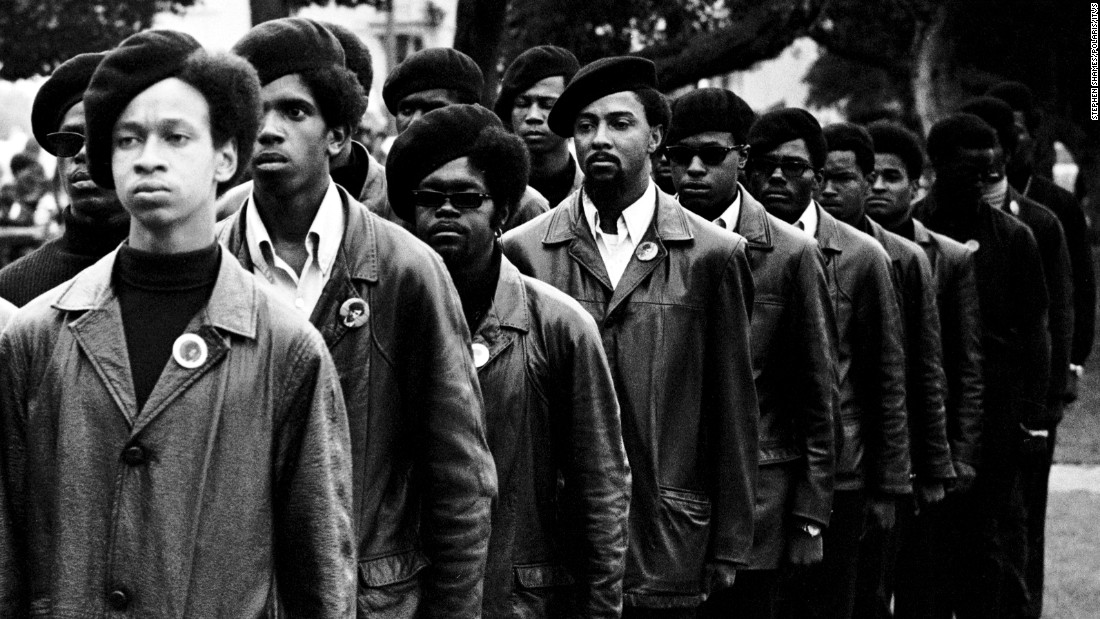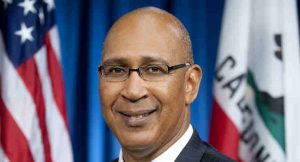Featured
Opinion: State Assembly Leaders Respond to National Park Service Yanking Grant for Black Panther History Project

By Anthony Rendon and Chris Holden
Apparently, history makes some people uncomfortable.
The facts make some people uncomfortable.
Pressure from people with a limited grasp of the past recently led the National Park Service to cancel a University of California historical research project regarding the Black Panther Party.
We know the Black Panthers are controversial. Even the document that awarded the grant refers to “the complex history of the Black Panther Party.”
But the project was for understanding that history, for probing into it, and how it related to historical incidents going back to World War II.
Instead of exploring history, we get an attempt to cover up the past by defunding the project.
The Fraternal Order of Police wrote to President Donald Trump, protesting the grant for the research.
That group has a complex history of its own, including protesting sales of Black Lives Matter t-shirts.
In their letter to the President, they called the Black Panthers “anti-American,” and quoted old FBI statements labeling it as “a black extremist group” advocating the “overthrow of the U.S. Government.”
FBI Director J. Edgar Hoover listed the Black Panthers as a hate group.
Yet, the FBI’s anti-Black Panther history goes far beyond that. The Black Panthers were subjected to constant surveillance, infiltration and attempts to discredit their activities.
Its members were criminalized, attacked, and sometimes killed for their pursuit of justice in the Black community.
Much of this was covered in an exhibit this year at the Oakland Museum of California. It is history.

Assemblymember Chris Holden
A thorough look at the Panthers’ history would include – as the Oakland museum did – the Party’s original 10 “wants.” They started with freedom, employment, and education, before getting to point 7: “We want an immediate end to police brutality and the murder of black people.”
Officially sanctioned violence against Blacks is a fact of American history, going back to the Atlantic Slave Trade.
The letter opposing the National Park Service grant barely touches on that shameful past, and in a skewed manner.
The letter suggests a parallel between its opposition to the research project and opposition to memorials to the Confederacy that subjugated Blacks as slaves. That is wrong.
To call Confederate markers, as the letter does, “memorials to aspects of the darker times in our history,” glosses over the 400-year legacy of the horrors inflicted on African Americans and on our country by the Confederacy.
Today, communities of color still face negative reactions for organizing to pursue justice and equality in the face of incidents of peace officer violence.
Groups like Black Lives Matter are seen as threats to a conservative world view. Those who share that view use the killing of a park ranger by a Panther as an excuse to defund the Black Panther project.
That is an attempt to cover up history.
Some members of the Black Panthers committed inexcusable acts. We won’t cover that up.
But we also know Black Panthers filled a void in the social safety net for its community through programs such as benefits counseling; drug/alcohol abuse awareness programs; free food, dental, and health programs; and much more.

Speaker Anthony Rendon
The historical research project that has been aborted promised to collect oral histories by those affected by the Black Panthers and their movement.
The project award document put out by the Parks Service speaks to an effort to “truthfully” address the legacy of the Black Panthers.
Those who want to stifle the project seem afraid to engage in meaningful dialogue about the past.
If history, any history, offers a lesson to us, it is that they will not be successful in the long run.
It has been suggested by Martin Luther King, Jr. and by Theodore Parker, a 19th-century anti-slavery activist, that the arc of the moral universe bends towards justice.
Maybe it’s right for opponents of this research to be afraid of history, because the facts suggest history will not be kind to them.
Speaker Anthony Rendon (D-Lakewood) is the 70th Speaker of the California State Assembly. Assemblymember Chris Holden is the Chair of the California Black Caucus (D-Pasadena).
Activism
Over 500 Join Interfaith Rally in Solidarity with Los Angeles Resistance to Trump Invasion
Over 500 people attended the Tuesday evening rally in Oakland, which was held simultaneously with a prayer vigil in Los Angeles, where rabbis, pastors, Muslim faith leaders, and indigenous spiritual leaders gathered to pray and speak out about the federal government’s abuses of power.

By Post Staff
n response to last week’s “invasion” of Los Angeles by armed and masked federal agents, East Bay faith leaders and community members, joined by Oakland Mayor Barbara Lee and Alameda County Supervisor Nikki Fortunato Bas, held an Interfaith vigil Tuesday evening at Oakland’s Fruitvale Plaza in support of Los Angeles residents and immigrant communities across the country.
Over 500 people attended the Tuesday evening rally in Oakland, which was held simultaneously with a prayer vigil in Los Angeles, where rabbis, pastors, Muslim faith leaders, and indigenous spiritual leaders gathered to pray and speak out about the federal government’s abuses of power.
Earlier on the same day, hundreds of protesters at San Francisco and Concord immigration courts shut down the courts after masked, plainclothes federal ICE agents detained people seeking asylum attending their court hearings.
“Too many families in Los Angeles torn apart by this invasion still do not have access to a lawyer — and that’s not an accident. We, the people, the community, are here to say, ‘Enough!’ We must keep organizing and demand that ICE and our government respect the rights of all people and uphold the principle of due process,” said Andrés Pomart with Trabajadores Unidos Workers United.
“We know that when we organize, we win. That’s why our communities – Black, Brown, and working-class – are coming together to support each other in solidarity. Together, as immigrant communities and as a united working class, we will not be divided nor intimidated nor live in fear,” Pomart said.
“Immigrant communities — yes, our immigrant communities — are the heartbeat of Oakland, enriching our neighborhoods with diverse cultures, languages and experience, and deserve the quality of life that every human being deserves. An attack on one of us is an attack on all of us. “Your city remains committed to protecting our immigrant neighbors,” said Mayor Lee.
“When Trump’s armed goons come for our families and communities, when they trample on our shared values of freedom and opportunity, when they make a mockery of our rights to due process, we are called to step up for our neighbors,” said Supervisor Bas. “This is not just an immigration story. It’s a story about who we are — and how we respond when our neighbors are under attack and when the president of the United States abuses his powers. When they come for one of us, they come for all of us.”
Said Kampala Taiz-Rancifer, the Oakland teachers’ union president, “It is time for us to say, ‘Not in our city.’ We will stop, we will block, we will drive out ICE. We will protect our classrooms. We will protect our streets. We will protect our homes. Together, we rise for the dignity of our families and our right to live without fear.”
“I feel that the president and the current administration is grossly overstepping and abusing their power,” Rabbi Chai Levy, speaking to KQED. “I feel that, as a religious person, communities of faith need to show up and stand in solidarity with immigrants who are threatened and afraid. “It’s important to show up as people of conscience and morality and say that we’re against what our government is doing.”
The vigil was hosted by Bay Resistance, and co-sponsoring organizations included the Alameda Labor Council, Alliance of Californians for Community Empowerment (ACCE), Faith in Action East Bay, Restore Oakland, East Bay Alliance for a Sustainable Economy (EBASE), Ella Baker Center for Human Rights, Oakland Rising, Faith Alliance for a Moral Economy, SEIU Local 1021, Communities United for Restorative Youth Justice (CURYJ), SEIU United Service Workers West, Jewish Voice for Peace Bay Area, Jobs with Justice San Francisco, Interfaith Movement for Human Integrity, Urban Peace Movement, and Trabajadores Unidos Workers United.
Activism
Oak Temple Hill Hosts Interfaith Leaders from Across the Bay Area
Distinguished faith leaders Rev. Ken Chambers, executive director the Interfaith Council of Alameda County (ICAC); Michael Pappas, executive director of the San Francisco Interfaith Council; and Dr. Ejaz Naqzi, president of the Contra Costa County Interfaith Council addressed the group on key issues including homelessness, food insecurity, immigration, and meaningful opportunities to care for individuals and communities in need.

Special to the Post
Interfaith leaders from the Bay Area participated in a panel discussion at the annual meeting of communication leaders from The Church of Jesus Christ of Latter-day Saints held on Temple Hill in Oakland on May 31. Distinguished faith leaders Rev. Ken Chambers, executive director the Interfaith Council of Alameda County (ICAC); Michael Pappas, executive director of the San Francisco Interfaith Council; and Dr. Ejaz Naqzi, president of the Contra Costa County Interfaith Council addressed the group on key issues including homelessness, food insecurity, immigration, and meaningful opportunities to care for individuals and communities in need.
Chambers, said he is thankful for the leadership and support of the Church of Jesus Christ Latter-Day Saints’ global ministry, which recently worked with the interfaith congregations of ICAC to help Yasjmine Oeveraas a homeless Norwegian mother and her family find shelter and access to government services.
Oeveraas told the story of how she was assisted by ICAC to the Oakland Post. “I’m a Norwegian citizen who escaped an abusive marriage with nowhere to go. We’ve been homeless in Florida since January 2024. Recently, we came to California for my son’s passport, but my plan to drive for Uber fell through, leaving us homeless again. Through 2-1-1, I was connected to Rev. Ken Chambers, pastor of the West Side Missionary Baptist Church and president of the Interfaith Council of Alameda County, and his car park program, which changed our lives. We spent about a week-and-a-half living in our car before being blessed with a trailer. After four years of uncertainty and 18 months of homelessness, this program has given us stability and hope again.
“Now, both my son and I have the opportunity to continue our education. I’m pursuing cyber analytics, something I couldn’t do while living in the car. My son can also complete his education, which is a huge relief. This program has given us the space to focus and regain our dignity. I am working harder than ever to reach my goals and give back to others in need.”
Richard Kopf, communication director for The Church of Jesus Christ in the Bay Area stated: “As followers of Jesus Christ, we embrace interfaith cooperation and are united in our efforts to show God’s love for all of his children.”
Alameda County
Council Approves Budget to Invest in Core City Services, Save Fire Stations, Invest in Economic Development
I am most proud of our ability to fund these critical city services without the use of one-time fixes. We are still suffering the consequences of last year’s budget, where a majority of the Council, myself not included, chose to incorporate anticipated proceeds from the sale of the Coliseum to fund essential services. Since the sale has still not yet been completed, the lack of funds led to drastic cuts in city services, including the temporary closure of fire stations, staff layoffs, and the cancellations of many service contracts.

By Janani Ramachandran, District 4 Oakland City Councilmember
On Wednesday, June 11, City Council took a bold step to prioritize investing in essential city services to get our beautiful Town back on track. As Chair of the Finance Committee, I am proud to have led a collaborative process, alongside Councilmembers Rowena Brown, Zac Unger, and Charlene Wang, to develop a set of amendments to the proposed FY 2025-2027 budget which passed successfully with a vote of 6 – 1. Despite facing a $265 million structural budget deficit, we were able to restore funding to ensure that all 25 fire stations remain open, fund 5 police academies, invest millions of dollars to combat illegal dumping and sideshow prevention, improve our permitting processes, fund a “business incentives” program to revitalize our commercial corridors, improve upon our homelessness prevention work, amplify the city’s anti-trafficking programs, re-instate our tree services division, staff up our Auditor’s office – all while preventing any layoffs of city staff, keeping our senior centers and after-school programs open, and crisis services like MACRO funded.
I am most proud of our ability to fund these critical city services without the use of one-time fixes. We are still suffering the consequences of last year’s budget, where a majority of the Council, myself not included, chose to incorporate anticipated proceeds from the sale of the Coliseum to fund essential services. Since the sale has still not yet been completed, the lack of funds led to drastic cuts in city services, including the temporary closure of fire stations, staff layoffs, and the cancellations of many service contracts. The budget that we passed this week proudly does not fund recurring expenses with anticipated one-time revenue – and moves our city towards being fiscally responsible with our taxpayers’ funds.
Our budget comes in response to the widespread and consistent calls from across Oakland’s diverse communities asking us to prioritize funding solutions to the issues that have most directly impacted our residents’ safety and quality of life. Our priorities are also inspired by our belief that Oakland is on the way not only to financial recovery, but also to global recognition. Oakland can attract and preserve businesses of all sizes with safer, cleaner streets. We can and will have more large-scale festivals that celebrate our culture, concerts that uplift our incredible local musicians, conferences that attract patrons from across the world, and award-winning restaurants that top national charts. We are on our way to rebuilding a thriving economy and having a cultural renaissance will create more jobs for Oaklanders while also generating more revenue for the City through sales and business taxes.
I am grateful for the close partnership with our new Mayor Barbara Lee, and know that she shares our values of ensuring we are prioritizing keeping Oakland’s residents safe, our streets clean, and our businesses prosperous in an open and fiscally responsible manner. I am also thankful to our City Administrator, Jestin Johnson, and former Interim Mayor Kevin Jenkins’ efforts to produce the initial proposal that our Council budget team used as a starting point for our amendments, and for their shared commitment to transparency and ethical government. I am especially grateful for every resident that took the time to make their voice heard throughout this rigorous budget process. I have no doubt that we are on the verge of true change, and that together we will bring Oakland back to being the world-class city I know it can be.
-

 Activism4 weeks ago
Activism4 weeks agoAfter Two Decades, Oakland Unified Will Finally Regain Local Control
-

 Activism4 weeks ago
Activism4 weeks agoOakland Post: Week of May 14 – 20, 2025
-

 Alameda County4 weeks ago
Alameda County4 weeks agoOakland Begins Month-Long Closure on Largest Homeless Encampment
-

 Activism4 weeks ago
Activism4 weeks agoNew Oakland Moving Forward
-

 Barbara Lee4 weeks ago
Barbara Lee4 weeks agoWNBA’s Golden State Valkyries Kick Off Season with Community Programs in Oakland
-

 Activism4 weeks ago
Activism4 weeks agoEast Bay Community Foundation’s New Grants Give Oakland’s Small Businesses a Boost
-

 Activism4 weeks ago
Activism4 weeks agoOPINION: Your Voice and Vote Impact the Quality of Your Health Care
-

 Activism4 weeks ago
Activism4 weeks agoOakland Hosts Town Hall Addressing Lead Hazards in City Housing




















































